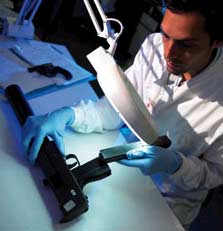New DNA tracking software provides massive boost to forensic science
24 Mar 2009
 UK forensic scientists have developed a new technique which can decode previously undecipherable DNA samples throwing up the possibility of increased convictions in current criminal cases and shedding light on ''many thousands" of unsolved cases. The new technique has now been made available to police forces in England and Wales.
UK forensic scientists have developed a new technique which can decode previously undecipherable DNA samples throwing up the possibility of increased convictions in current criminal cases and shedding light on ''many thousands" of unsolved cases. The new technique has now been made available to police forces in England and Wales.
 According to the UK's Forensic Science Service (FSS) the 'DNA Boost' method marks the most significant advancement in forensic sciences "in a decade." It said the method would be used in all serious crimes, including rapes and murders.
According to the UK's Forensic Science Service (FSS) the 'DNA Boost' method marks the most significant advancement in forensic sciences "in a decade." It said the method would be used in all serious crimes, including rapes and murders.
A DNA profile is a "genetic fingerprint", which is unique to each person.
The FSS said the technique had proved successful in a series of pilot cases, where it was applied on about 2,000 samples in four police divisions of the country. According to the FSS the method helped police identify suspects and build evidence for cases, and was now "fit for purpose" to be used by all forces.
The 'DNA Boost' is actually computer software which is capable of matching "pairs" of mixed DNA data, creating possible DNA matches. Results can then be fed into the national database, which currently contains the details of about four million people, and help in identifying suspects.
The effectiveness of the method has now prompted police forces and forensic scientists to comb the archives of thousands of "cold cases" for DNA samples which could now be re-processed using the method. Cold cases are those in which no-one has been convicted of the crime.
Though DNA analysis marked a big breakthrough for police forces in solving crime, scientists and policemen still faced certain handicaps. It was impossible for scientists, for instance, to accurately differentiate DNA samples of different individuals at one crime scene- for instance, in a case where two or three suspects would have handled the same weapon.
Now, 'DNA Boost' can use computer technology to provide separate DNA profiles for each suspect.
Experts estimate that the technique could be of use in an as many as 10,000 criminal cases each year and boost convictions by as much as 30 per cent.
The FSS analyses DNA evidence from about 100,000 cases every year. Of these about 10 per cent involve mixed or poor quality samples where 'DNA Boost' could be of immense value.
FSS scientists said that 'DNA Boost' was the greatest breakthrough in forensic science since the late 1990s when low copy number testing was introduced. This technique allowed profiles to be built from tiny samples of DNA.
They insist that the new technique was "scientifically robust," and that there was ''…little potential for both false inclusion and false exclusion."



















